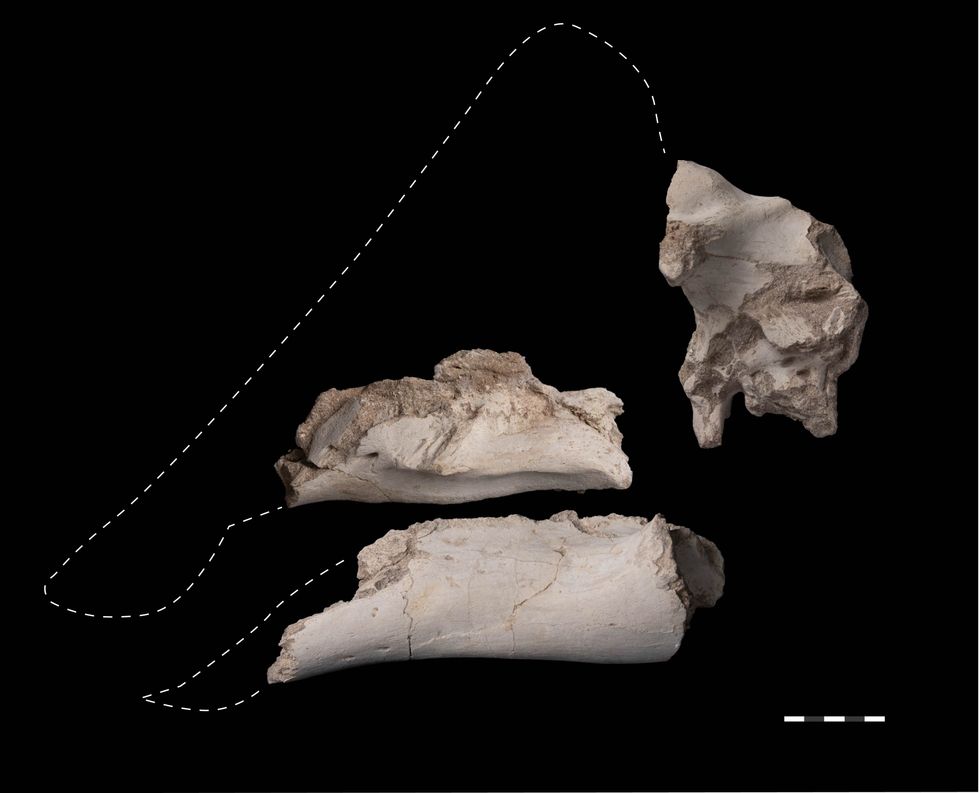The new discovery has revealed a 'perplexing' link between Africa and Europe
Nick Longrich
The revelation has shed light on a new connection between Europe and Africa during the Cretaceous period
Don't Miss
Most Read
Trending on GB News
Paleontologists have discovered duck-billed dinosaur fossils in Morocco, which has revealed a “perplexing” discovery between Europe and Africa.
Scientists have theorised that the species swam hundreds of miles from one continent to another when Africa was an isolated island landmass and “surrounded on all sides by water” 66 million years ago.
A new study published in Scientific Reports is challenging established definitions of dinosaurs, who have been long believed to be land-based creatures.
Whilst some species may have been able to paddle in bodies of water, it has never been thought that they could swim for such long distances.

Part of the braincase of the new species, indicating they were small in size
Nick Longrich
Yet fossils recently discovered in Morocco have unveiled a new species of duck-billed dinosaur, Minqaria bata, which measured three to four meters long and weighed about 250 kg, similar in size to a pony, according to researchers from the UK, Spain, France and Morocco.
A total of three duck-billed species, who resemble the European species, have now been found in North Africa.
Duck-billed dinosaurs, also known as hadrosaurids, emerged in North America in the late Cretaceous period and were able to travel into Europe and Asia when those continents were still connected.
However, as Africa was isolated millions of years prior to the existence of the duck-billed dinosaurs, it was inaccessible to them.
LATEST DEVELOPMENTS:

A diagram indicating the size of the new species in comparison to humans and other dinosaurs
Nick Longrich
The discovery of the new species shows that “duckbill dinosaurs, evolving long after the land connections had been broken, somehow managed to get to Africa”.
Dr Nicholas Longrich, from the University of Bath and one of the report’s authors, said: “The anatomy of the new duckbill closely resembles that of European species, suggesting that the duckbills swam or floated across several hundred kilometres of open water to colonise North Africa.
“It’s extremely improbable that dinosaurs could cross water to get to Africa, but improbable isn’t the same as impossible. And given enough time, improbable things become probable.
“These ocean crossings might be once-in-a-million-year events but the Cretaceous lasted nearly 100 million years.”

Fragments of the skull of the new species
Nick Longrich
Longrich said that this might be the most shocking discovery of his career so far.
He has suggested that the species were likely social animals, similar to modern birds. Their enlarged brain, similar to social animals such as cows and primates, adds to this theory.
The author has theorised that there were probably loud and lively herds of these duckbills roaming the coasts of Morocco millions of years ago.
Dr Nour-Eddine Jalil, from the Natural History Museum in Paris and co-author of the report, said: “Minqaria and its relatives are players that a few years ago we would never have supposed to be on the African continent at that time.”








